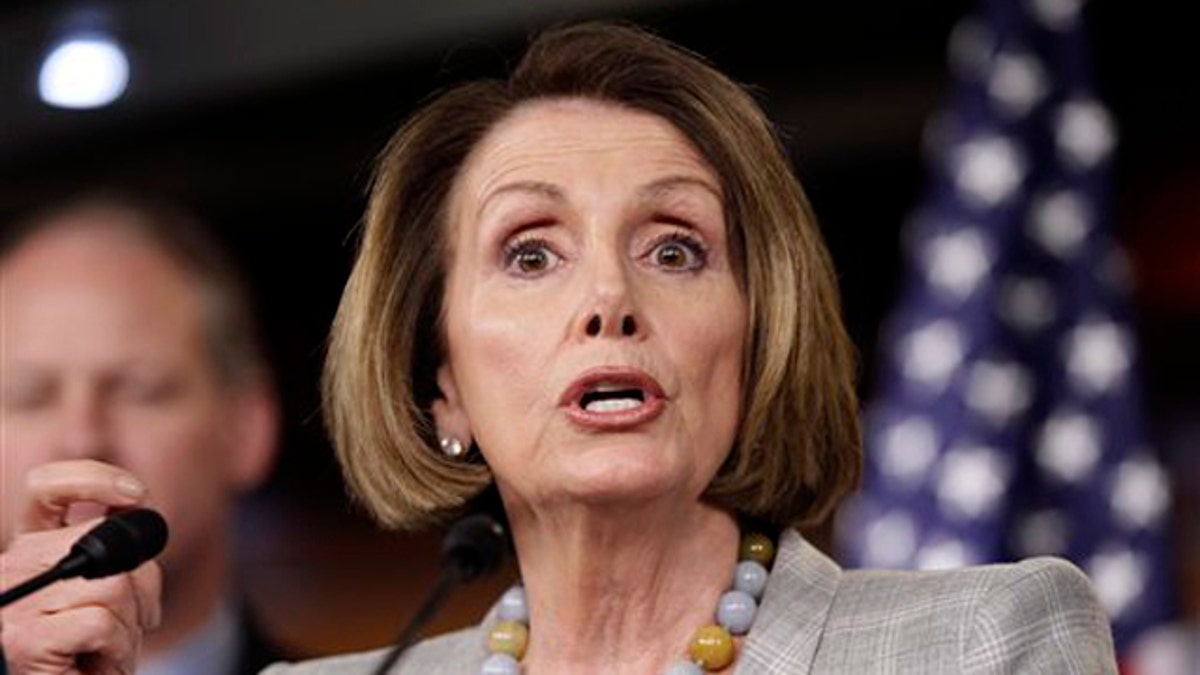
House Minority Leader Nancy Pelosi speaks to reporters June 16 on Capitol Hill in Washington. (AP)
House Minority Leader Nancy Pelosi, coming out of a meeting with rank-and-file Democrats, declared Friday that lawmakers in her party are "firm" in their opposition to Medicare and Social Security benefit cuts, as the White House puts entitlement programs on the table in bipartisan deficit-reduction talks.
Pelosi's comments underscore the tension flaring within the Democratic caucus over the potential course of talks as they pick up steam after temporarily breaking apart amid GOP objections. As President Obama coaxes Republicans back to the bargaining table, Democrats are expressing concern that he might offer too many concessions in order to gain their support on raising the debt ceiling before an Aug. 2 deadline.
"They're as firm as ever on what I have been saying," Pelosi told reporters Friday afternoon, as she shuttled between meetings. She said Democrats do not want to "subsidize tax cuts for the rich" on the backs of seniors and others, and are demanding "no benefits cuts in Medicare and Social Security." She also said she has "serious concerns" about what might happen with Medicaid.
"This is a big deal. ... It's a 10-year bill and we want to work together to have something that has bipartisanship, that has balance," she said. "It has to be reflective of our values."
Still, ahead of another meeting scheduled for Sunday evening, Pelosi said she's "optimistic."
With Democrats demanding entitlements be left alone and Republicans demanding steep cuts without tax hikes, the president has a heavy lift in trying to reconcile the two sides in pursuit of a deal.
White House Press Secretary Jay Carney said Friday it is "absolutely necessary" to extract "savings" out of entitlements. However, he said that doesn't mean "transferring all of the burden onto seniors."
"We certainly don't think in order to pay for tax cuts or to balance the budget that we need to essentially end Medicare as we know it and voucherize it," Carney said.
But asked whether Democrats would be feeling "political pain" over entitlements, Carney said they would.
"Absolutely there are tough choices here that in a different world we may not make. And we expect Republicans to do the same -- to make tough choices that in their perfect world they would not have to make," Carney said.
Republicans are not on the same page as Obama either. House Speaker John Boehner said Friday there is "no imminent deal" and Republicans still have "serious disagreements" to work out. Republicans have insisted that they will not accept tax hikes as part of the deal -- though they've opened the door to discussing tax "loopholes."
But a senior House Republican source told Fox News that the president's contribution in Thursday's meeting was seen on their side of the aisle as progress.
The most vocal backlash over the talks appears to be coming from the left, particularly from Democrats still feeling burned over the president's deal with Republicans late last year to temporarily extend the Bush tax cuts.
"If a deal involves Medicare, Social Security, and Medicaid, that has political consequences that would befall both parties," Rep. Raul Grijalva, D-Ariz., said.
After Pelosi met Friday morning with Obama, sources told Fox News she told the president directly that revenues must be on the table and her caucus will not compromise on Medicare.
The House Progressive Caucus told Obama Thursday that Medicare, Medicaid, and Social Security entitlement programs should be off the table in any negotiations over raising the nation's debt limit. They added that any deal must include an increase in revenues in order to pass muster with their voting bloc.
In the House, Obama technically wouldn't need Democrats to approve a deficit-reduction deal if the entire GOP caucus were on board. But because some Republicans are likely to oppose a debt ceiling increase no matter the details of a trade-off, the president will need to win some Democratic support. Democrats also still control the Senate, though there are several moderate Democrats in the chamber who could get behind a "grand bargain" that drives down spending significantly.
The White House is increasingly talking about a major compromise that achieves far more in deficit reduction than was originally discussed.
"Bigness is our target," Carney said Thursday, after Obama finished meeting with eight congressional leaders at the White House. He compared the negotiations to those that yielded a balanced budget during the Clinton administration.
"The opportunity to do something this significant does not present itself very often. The stars, in some ways, have aligned here because of the circumstances of the economy, the dynamic in Washington, the recognition by members of both parties of what the problem is in a very real sense," Carney said.
Fox News' Chad Pergram contributed to this report.











































